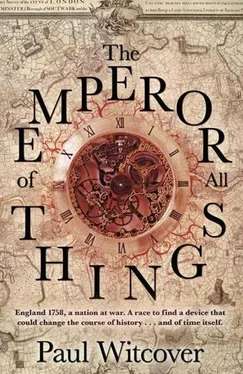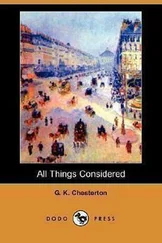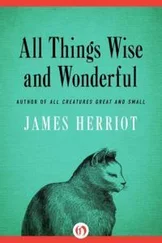Quare knew this without question, deep in his bones. He had seen the hole punched into his back, the flowering bruise and scab. How, after the violation of such a stabbing, could he be walking now, heart beating , lungs drawing air? It was, he knew, a pure impossibility. Yet equally impossible was a pocket watch that derived its motive energy from blood and was capable of killing a roomful of cats in the blink of an eye. That these two impossible things should not be linked as closely as effect and cause struck Quare as a third, and even greater, impossibility.
Somehow, when the watch had drunk his blood, it had done something to him, changed his inner workings. There was no other explanation. Yet what the change consisted of, he could not say. Certainly it had not rendered him impervious to injury, as his wounded leg and shoulder both reminded him at every step. What then? It was a mystery as profound as that of the watch itself. Quare considered himself to be a man of science, of reason, but this went far beyond any science or reason that he knew of or could even imagine. It was as if objects had begun to fall upwards in his vicinity, the laws of Nature, and of Nature’s God, suddenly and arbitrarily set aside. And what of Grimalkin, who sought the watch for her own purposes, and had tracked him down on the basis of some asserted sanguinary bond to demand or rather beg his assistance in stealing back the very object he had stolen from her in the first place? What had happened to her? Where had she disappeared to … and why, if she were looking out for him, as she had implied, had she not helped him in turn, when he was most in need of it? The whole business was disturbing on a number of levels, from the physical to the metaphysical.
To Quare’s relief, he and Mrs Puddinge arrived at the guild hall without incident. He had chosen a somewhat roundabout route for the journey, via Bread Street, Milk Street, Aldermanbury and Jasper Street, thence to London Wall and eastward to Wormwood Street, but approaching now down crowded Bishopsgate Street he had a good view of the venerable Gothic-style building with its broad front steps, thick wooden double doors, and, presiding over the façade from above, the great turret clock built by Thomas Tompion more than fifty years ago to replace the clock that had been there since long before the guild was founded, it having been decided around the turn of the century that the timepiece which was, as it were, the public face of the Worshipful Company should at least be seen to keep accurate time. Tompion’s clock, known affectionately as Old Tom, with its hourly parade of fanciful figures from fairy tales, mythology, and the Bible, all somehow related to time – cowled Death with his hourglass and scythe; Joshua commanding the sun to stand still; the christening of Sleeping Beauty, with the twelve invited fairies, and the unlucky thirteenth, clustered around the cradle – presented a marvellous spectacle to the eye but was equally marvellous in what was hidden from public view: a double three-legged gravity escapement, one of the many horological innovations jealously hoarded by the guild – a secret technology which, even after more than half a century, had yet to pass into common knowledge. That, Quare thought now, and not for the first time, was a perfect allegory for the guild itself: a beautiful exterior concealing something wondrous made ugly – the avariciousness with which the masters sat atop their piled treasures like cold-blooded dragons coiled on heaps of stolen gold.
He did not advance straight to the hall but spent some moments observing its environs from what he judged a safe distance, looking for any sign that men of the watch were lying in wait. He saw nothing that raised his suspicions, only the everyday hustle and bustle. Mrs Puddinge urged him forward, afraid that Aylesford might take this final opportunity to prevent them from reaching their goal, and at last he bowed to her impatience, and to his own, and led her across the crowded thoroughfare, weaving with practised ease through the noisy flow of pedestrians, carriages and carts, Mrs Puddinge clasping his arm with one hand while, with the other, she lifted her skirts above the appalling filth of the cobblestones.
Quare more than half expected to hear a shouted demand to halt, or to feel a hand clamp down on his shoulder from behind, but no one interfered as they climbed the steps to the front doors. The entrance of the hall was open to all, and thus there was no need to knock; he pushed one of the double doors open and strode into a gloomy, cavernous space, like the nave of a cathedral, in which stalls for the sale and repair of clocks and watches did a brisk business by candlelight and what drab illumination filtered through tall lancet windows high above, the glass of which, though daily cleaned by apprentices, seemed always coated with coal dust and grime.
A swell of murmurous voices echoed in the chill air. In lulls of conversation , Quare heard the ticking of a host of clocks, a welcome sound under the circumstances even though there was scant agreement between them, like a roomful of pedants talking past each other in urgent whispers. Here, too, the Charleys could have been waiting, but even if they had been – which did not seem to be the case – they could not touch him; the Worshipful Company had been granted certain privileges in its charter, prerogatives that it clung to as jealously as it clung to its hoard of secrets, if not more so, and by those terms it was the Worshipful Company, not the city watch, that, at least initially, exercised legal authority over its own members within the environs of the guild hall. Even had the watch been present, and tried to question him, the guild would not have permitted it. He was safe here, among his brothers, his family. He felt a weight slip from his shoulders.
‘The moneychangers in the temple,’ said Mrs Puddinge in a low voice beside him as they crossed the space to the far side, where another door barred the way to the inner reaches of the hall.
‘I beg your pardon?’ Quare glanced down at her, surprised at the vehemence in her tone. She was surveying the stalls with evident disapproval.
‘That’s what Mr Puddinge called them,’ she told him with a self-conscious smile. ‘He thought the guild hall should be free of commerce, that at least here, within these walls, the Worshipful Company should be more, well, worshipful .’
‘Sounds like a man after my own heart, Mrs P.’
She gave his arm a companionable squeeze.
‘Strange,’ he said, dropping his own voice. ‘Everything seems so normal, does it not?’
‘Yes, I was noticing that,’ she agreed. ‘Do you suppose Mr Aylesford was lying about everything? That no one has died after all?’
‘We shall soon learn the truth of it,’ he said.
As they crossed the floor, Quare saw a number of journeymen and apprentices known to him, men and boys he would ordinarily have stopped and spoken to, for this antechamber of the guild hall was a great place for gossip and socializing. But now the urgency he felt in communicating what he had learned of Aylesford, along with his need to know Master Magnus’s fate, impelled him past his acquaintances with nothing more than a nod and a searching glance. He found it odd, however, that not one of his fellows attempted to address him, and that few of them would meet his gaze … and when they did, there was an unaccustomed hardness in their eyes, a kind of reproach that filled him with misgivings. Behind them, he heard fresh whisperings, like dry leaves stirred up in the wake of a breeze. The skin at the back of his neck prickled. Mrs Puddinge seemed to sense it, too, for she grew silent and tightened her grip on his arm.
They drew up to the inner door, and Quare knocked – admittance beyond this point was reserved to guild members. The door opened, and a liveried servant asked him his business, his powdered face expressionless; even his voice seemed dusted with powder.
Читать дальше












